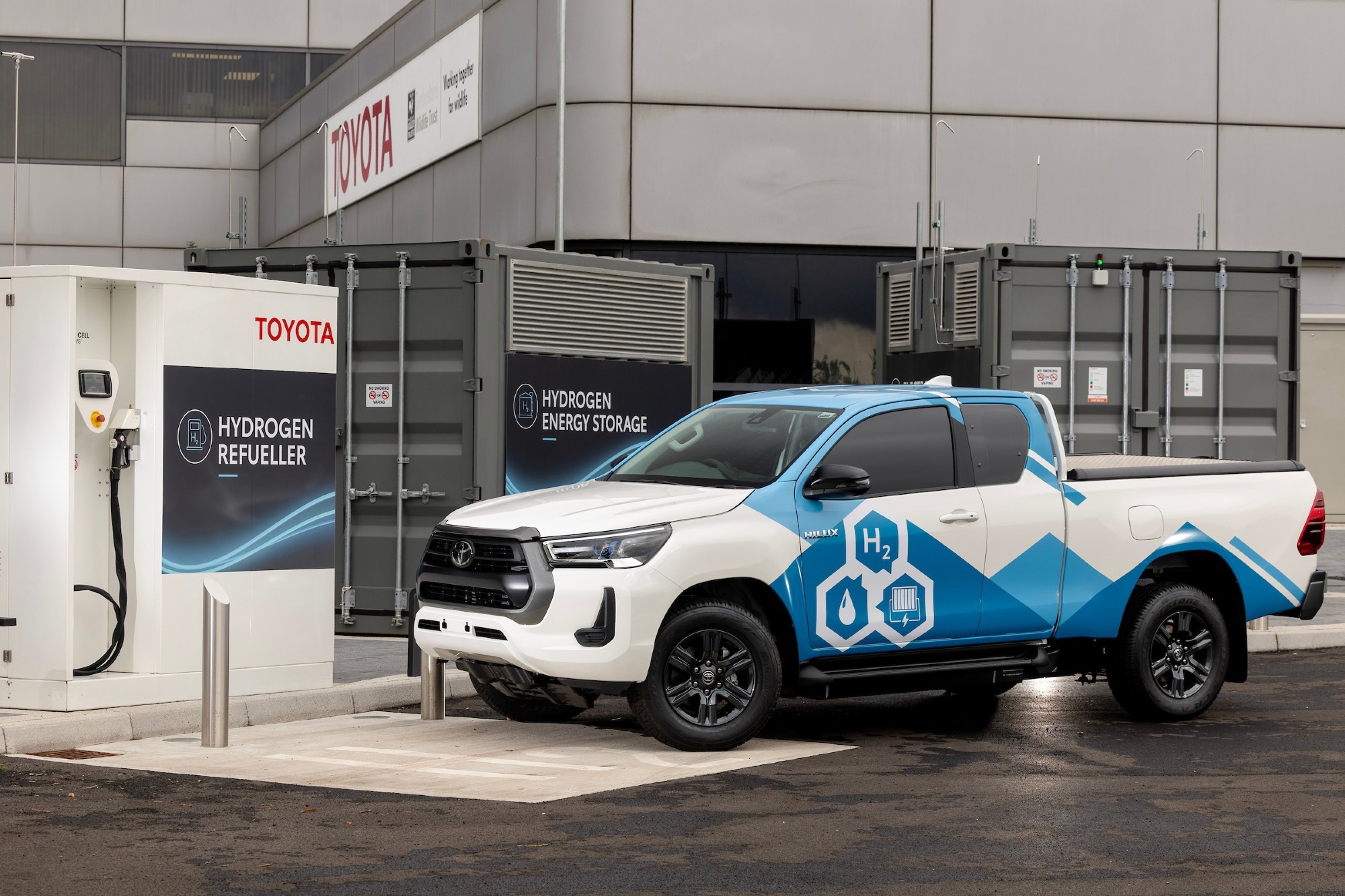Toyota has reached another milestone in its progress towards zero carbon with the unveiling today of a prototype hydrogen fuel cell-powered Hilux.

Image Credit: Toyota
Its debut is a further demonstration of the broad scope of Toyota’s multi-technology strategy for ultimately achieving carbon-free mobility, applying different powertrain solutions – hybrid electric, plug-in hybrid electric, battery electric and fuel cell electric – to suit different user needs and operating environments worldwide.
The ground-breaking pick-up was revealed at Toyota Manufacturing UK’s Burnaston car plant in Derby, where it has been developed in a joint project with consortium partners, supported by UK Government funding.
Hilux is a global icon of the Toyota brand with a reputation for exceptional reliability and durability. The development project has explored how these qualities might be maintained while adopting a new electrified powertrain.
Minister for Industry and Economic Security Nusrat Ghani said: “We have an amazing manufacturing sector here in the UK, and this is a great example. It’s fantastic to see Toyota reach another milestone on their journey to zero emissions here in Britain, and I congratulate the project team for their success on this cutting-edge development. This is a great vote of confidence in UK manufacturing and its potential to deliver carbon-free vehicles to meet future targets.”
Richard Kenworthy, TMUK Managing Director, said: “The project team have accomplished an incredible job in a very short space of time, from creating the prototype build area to completion of the first vehicle. The UK Government funding has enabled us not only to develop a new vehicle in record time, but also to upskill our teams to work on hydrogen-related technologies, something we hope to build on in the future.
“This is a great vote of confidence in UK manufacturing and its potential to deliver carbon-free vehicles to meet future targets.”
Ian Constance APC Chief Executive, commented: “The Toyota Hilux project is a fantastic example of collaborative R&D which has designed, integrated, and delivered a hydrogen fuel cell vehicle. UK Government funding through the Advanced Propulsion Centre (APC) anchors capability in R&D, which helps safeguard and creates new jobs for the future. It embeds the next generation of net-zero vehicles and technologies in the UK.
“The project consortium has made significant progress to deliver several vehicle demonstrators developed and built in the UK. Seeing the prototype hydrogen fuel cell Toyota Hilux global launch within a year of the start of the project is a clear demonstration of the capabilities and strengths of the UK’s automotive supply chain.”
Vehicle Profile
The new powertrain uses core elements from the Toyota Mirai hydrogen fuel cell electric saloon – technology that has proved its quality in almost 10 years of commercial production. When driven, the fuel cell produces no tailpipe emissions other than pure water.
Three high-pressure fuel tanks are used, giving the Hilux an expected driving range of more than 365 miles – significantly further than might be achieved with a battery electric system. The battery, which stores electricity produced on-board by the fuel cell, is positioned in the rear load deck, avoiding loss of cabin space.
Project History
The project began in early 2022 with a feasibility study undertaken by TMUK and Toyota Motor Europe with consortium partners Ricardo, ETL, D2H Advanced Technologies and Thatcham Research. Funding was subsequently gained from the UK Government through the Advanced Propulsion Centre, a non-profit organisation supporting the development of cleaner technologies and new mobility concepts. This enabled the start of an intense design and development programme from 1 July 2022, with additional support from Toyota Motor Corporation (TMC). Prototype construction began on 5 June this year, working to Toyota Production System principles in a dedicated area within the TMUK facility. The first vehicle was completed just three weeks later, the first of 10 that will be built by the end of this year. These will undergo rigorous testing around the world to ensure safety, dynamic performance, functionality and durability meet the high standards required of a production model.
The project has enabled TMUK members to develop and apply new skills relating to fuel cell electrified vehicles and hydrogen system components. The consortium members have also all played key roles in the initial phase of the programme. Ricardo has supported preparations for the prototype build, carrying out design and development tasks and confirming the complete manufacturing process in parallel with teams at TMUK. It will undertake complete evaluation of the vehicle over the coming months. Thatcham Research, the automotive risk intelligence company dedicated to understanding the opportunities and risks of new vehicle technology, supported the project through the provision of sustainable repair consultancy and the preparation of hydrogen training for the repair market.